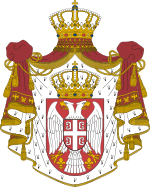Politics of Serbia | |
|---|---|
 | |
| Polity type | Unitary parliamentary constitutional republic |
| Constitution | Constitution of Serbia |
| Formation | 5 June 2006 |
| Legislative branch | |
| Name | National Assembly |
| Type | Unicameral |
| Presiding officer | Ana Brnabić, President of the National Assembly |
| Executive branch | |
| Head of state | |
| Title | President of the Republic |
| Currently | Aleksandar Vučić |
| Appointer | Direct popular vote |
| Head of government | |
| Title | Prime Minister |
| Currently | Miloš Vučević |
| Appointer | President of the Republic (nominator) National Assembly (appointer) |
| Cabinet | |
| Current cabinet | Cabinet of Miloš Vučević |
| Leader | Prime Minister |
| Appointer | National Assembly |
| Ministries | 21 |
| Judicial branch | |
| Name | Judiciary |
| Supreme Court | |
| Chief judge | Jasmina Vasović |
The Politics of Serbia are defined by a unitary parliamentary framework that is defined by the Constitution of Serbia in which the President of the Republic is the head of state while the Prime Minister is the head of government. Executive power is exercised by the Government (consisted of the cabinet that includes Prime Minister and ministers) and the President of the Republic. Legislative power is vested in the unicameral National Assembly which is composed of 250 proportionally elected deputies. The judiciary is independent from the executive and the legislature and is headed by the Supreme Court, the highest court in the country.
The Economist Intelligence Unit rated Serbia as a "flawed democracy" in 2023 and ranked country 64th in the world on its Democracy Index.[1]